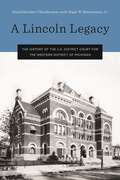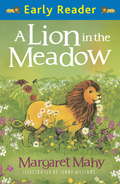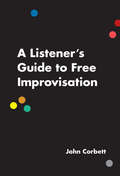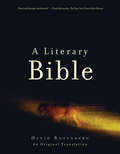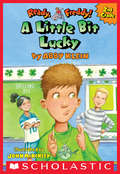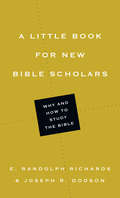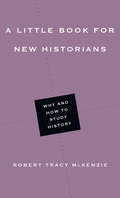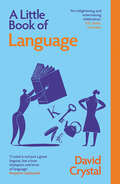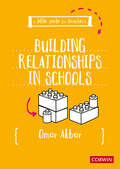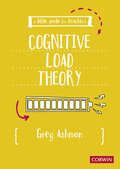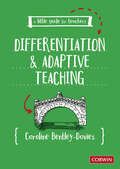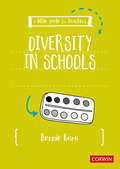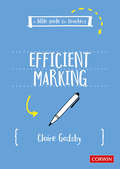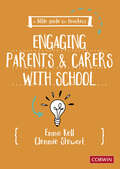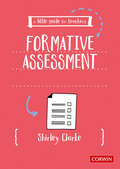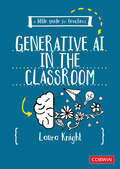- Table View
- List View
A Lincoln Legacy: The History of the U.S. District Court for the Western District of Michigan (Great Lakes Books Series)
by David Gardner Chardavoyne Hugh W. JrA Lincoln Legacy: The History of the U.S. District Court for the Western District of Michigan by David Gardner Chardavoyne with Hugh W. Brenneman, Jr. provides the first and only comprehensive examination of the history of the United States federal courts in the Western District of Michigan. The federal courts were established by the U.S. Constitution to adjudicate disputes involving federal laws, disputes between litigants from different states involving state and federal laws, and to punish violations of criminal laws passed by Congress. During the Civil War, Abraham Lincoln signed legislation creating two federal districts in the state of Michigan: the Eastern and Western Districts—the latter of which is headquartered in Grand Rapids and which now encompasses the western half of the Lower Peninsula and all of the Upper Peninsula. With the rapid expansion of legislation passed by Congress, the increasing mobility of society, and the growth of interstate commerce, the federal courts have assumed an important and sometimes dominant role in major litigation today. In A Lincoln Legacy, Chardavoyne tracks the history of these courts over eleven chapters, from their creation by the Northwest Ordinance of 1787 to 2020. He discusses the changes in society that drove the evolving federal litigation and some significant cases heard in the Western District. Additionally, fifteen appendices are included in the book, listing of all the federal circuit and district judges in the Western District; commissioners; magistrate judges and bankruptcy judges; U.S. Attorneys; clerks of the courts; and more. Chardavoyne also identifies auxiliary offices and organizations revolving around the federal court that play a major role in its activities (e.g., the U.S. Attorney’s Office, the Federal Public Defender’s Office, the Federal Bar Association, etc.). A Lincoln Legacy provides a thorough examination of the history of the federal courts of Western Michigan. It will appeal to those learning and practicing law, as well as those with an interest in Michigan history.
A Lion In The Meadow: Early Reader (Early Reader)
by Margaret MahyEarly Readers are stepping stones from picture books to reading books. A blue Early Reader is perfect for sharing and reading together. A red Early Reader is the next step on your reading journey.When the little boy tells his mother he has seen a big, roaring, yellow, whiskery lion in the meadow, she decides to make up a story for him too and gives him a matchbox with a tiny dragon inside. A brand new Early Reader edition of this beautiful classic story.
A Lion in the Meadow
by Margaret MahyIn the quiet meadow, the grass is green, and the apple tree has lots of apples. Underneath the apple tree is...? Other books by Margaret Mahy are available in this library.
A Listener's Guide to Free Improvisation
by John CorbettImprovisation rattles some listeners. Maybe they're even suspicious of it. John Coltrane's saxophonic flights of fancy, Jimi Hendrix's feedback drenched guitar solos, Ravi Shankar's sitar extrapolations--all these sounds seem like so much noodling or jamming, indulgent self-expression. "Just" improvising, as is sometimes said. For these music fans, it seems natural that music is meant to be composed. In the first book of its kind, John Corbett's A Listener's Guide to Free Improvisation provides a how-to manual for the most extreme example of spontaneous improvising: music with no pre-planned material at all. Drawing on over three decades of writing about, presenting, playing, teaching, and studying freely improvised music, Corbett offers an enriching set of tools that show any curious listener how to really listen, and he encourages them to enjoy the human impulse-- found all around the world-- to make up music on the spot. Corbett equips his reader for a journey into a difficult musical landscape, where there is no steady beat, no pre-ordained format, no overarching melodic or harmonic framework, and where tones can ring with the sharpest of burrs. In "Fundamentals," he explores key areas of interest, such as how the musicians interact, the malleability of time, overcoming impatience, and watching out for changes and transitions; he grounds these observations in concrete listening exercises, a veritable training regime for musical attentiveness. Then he takes readers deeper in "Advanced Techniques," plumbing the philosophical conundrums at the heart of free improvisation, including topics such as the influence of the audience and the counterintuitive challenge of listening while asleep. Scattered throughout are helpful and accessible lists of essential resources--recordings, books, videos-- and a registry of major practicing free improvisors from Noël Akchoté to John Zorn, particularly essential because this music is best experienced live. The result is a concise, humorous, and inspiring guide, a unique book that will help transform one of the world's most notoriously unapproachable artforms into a rewarding and enjoyable experience.
A Literary Bible: An Original Translation
by David RosenbergWhether rendering the Bible as wondrous or as strangely familiar, David Rosenberg's magisterial translation forces us to ask again-and at last in literary terms-why the Bible remains a crucial foundation of our culture.Until today, translators have presented a homogeneous Bible in uniform style-even as the various books within it were written by different authors, in diverse genres and periods, stretching over many centuries. Now, Rosenberg's artful translation restores what has been left aside: the essence of imaginative creation in the Bible.In A Literary Bible, Rosenberg presents for the first time a synthesis of the literary aspects of the Hebrew Bible-restoring a sense of the original authors and providing a literary revelation for the contemporary reader.Rosenberg himself brings a finely tuned ear to the original text. His penetrating scholarship allows the reader to encounter inspired biblical prose and verse, and to experience each book as if it were written for our time.
A Little Bit Lucky (Ready, Freddy! 2nd Grade #7)
by Abby Klein John MckinleyHow do you spell L-U-C-K-Y? The whole second grade is excited about the spelling bee, and Freddy's friends are all studying hard. Except Freddy-why study when he has his lucky shark tooth? But when the tooth goes missing, Freddy panics. Can his friends help him get ready for the big competition?
A Little Book for New Bible Scholars (Little Books)
by E. Randolph Richards Joseph R. DodsonMany young Bible scholars are passionate for the Scriptures. But is passion enough?A Little Book for New Bible Scholars
A Little Book for New Historians: Why and How to Study History (Little Books Series)
by Robert Tracy McKenzieMany people think of history as merely "the past"—or at most, information about the past. But the real work of a historian is to listen to the voices of those who have gone before and humbly remember the flesh and blood on the other side of the evidence. What is their story? How does it become part of our own? In A Little Book for New Historians veteran historian Robert Tracy McKenzie offers a concise, clear, and beautifully written introduction to the study of history. In addition to making a case for the discipline in our pragmatic, "present-tense" culture, McKenzie lays out necessary skills, methods, and attitudes for historians in training. Loaded with concrete examples and insightful principles, this primer shows how the study of history, faithfully pursued, can shape your heart as well as your mind.
A Little Book of Language (Little Histories)
by David CrystalWith a language disappearing every two weeks and neologisms springing up almost daily, an understanding of the origins and currency of language has never seemed more relevant. In this charming volume, a narrative history written explicitly for a young audience, expert linguist David Crystal proves why the story of language deserves retelling. From the first words of an infant to the peculiar modern dialect of text messaging, A Little Book of Language ranges widely, revealing language's myriad intricacies and quirks. In animated fashion, Crystal sheds light on the development of unique linguistic styles, the origins of obscure accents, and the search for the first written word. He discusses the plight of endangered languages, as well as successful cases of linguistic revitalization. Much more than a history, Crystal's work looks forward to the future of language, exploring the effect of technology on our day-to-day reading, writing, and speech. Through enlightening tables, diagrams, and quizzes, as well as Crystal's avuncular and entertaining style, A Little Book of Language will reveal the story of language to be a captivating tale for all ages.
A Little Guide for Teachers: Building Relationships in Schools (A Little Guide for Teachers)
by Omar AkbarRelationship building is often described as being key to a teacher’s success in and outside the classroom but rarely is its nuanced nature analysed or practical advice ever given on how to get the best from working relationships. This book covers everything you need to know about relationship building with students, support staff, stakeholders and parents. The Little Guide for Teachers series is little in size but BIG on all the support and inspiration you need to navigate your day to day life as a teacher. · Authored by experts in the field · Easy to dip in-and-out of · Interactive activities encourage you to write into the book and make it your own · Fun engaging illustrations throughout · Read in an afternoon or take as long as you like with it!
A Little Guide for Teachers: Building Relationships in Schools (A Little Guide for Teachers)
by Omar AkbarRelationship building is often described as being key to a teacher’s success in and outside the classroom but rarely is its nuanced nature analysed or practical advice ever given on how to get the best from working relationships. This book covers everything you need to know about relationship building with students, support staff, stakeholders and parents. The Little Guide for Teachers series is little in size but BIG on all the support and inspiration you need to navigate your day to day life as a teacher. · Authored by experts in the field · Easy to dip in-and-out of · Interactive activities encourage you to write into the book and make it your own · Fun engaging illustrations throughout · Read in an afternoon or take as long as you like with it!
A Little Guide for Teachers: Cognitive Load Theory (A Little Guide for Teachers)
by Greg AshmanCognitive load theory is a vital model for understanding how school students learn, but it’s often misunderstood and difficult to use effectively in the classroom. Greg Ashman guides you through the details with a clear jargon-free focus on how an understanding of cognitive load theory can enhance your teaching. The Little Guide for Teachers series is little in size but BIG on all the support and inspiration you need to navigate your day-to-day life as a teacher. Authored by experts in the field Easy to dip in-and-out of Interactive activities encourage you to write into the book and make it your own Read in an afternoon or take as long as you like with it!
A Little Guide for Teachers: Cognitive Load Theory (A Little Guide for Teachers)
by Greg AshmanCognitive load theory is a vital model for understanding how school students learn, but it’s often misunderstood and difficult to use effectively in the classroom. Greg Ashman guides you through the details with a clear jargon-free focus on how an understanding of cognitive load theory can enhance your teaching. The Little Guide for Teachers series is little in size but BIG on all the support and inspiration you need to navigate your day-to-day life as a teacher. Authored by experts in the field Easy to dip in-and-out of Interactive activities encourage you to write into the book and make it your own Read in an afternoon or take as long as you like with it!
A Little Guide for Teachers: Differentiation and Adaptive Teaching (A Little Guide for Teachers)
by Caroline Bentley-DaviesA Little Guide for Teachers: Differentiation and Adaptive Teaching seeks to support readers with one of the most challenging parts of teaching. Drawing upon the authors’ extensive teaching and training experience, this book references key research and offers an in-depth discussion on how teachers can meet the needs of each pupil. Offering hints and tips and ideas for the classroom, this book offers effective teaching techniques that can be drawn upon in the classroom. The Little Guide for Teachers series is little in size but BIG on all the support and inspiration you need to navigate your day-to-day life as a teacher. · Authored by experts in the field · Easy to dip in-and-out of · Interactive activities encourage you to write into the book and make it your own · Fun engaging illustrations throughout · Read in an afternoon or take as long as you like with it!
A Little Guide for Teachers: Differentiation and Adaptive Teaching (A Little Guide for Teachers)
by Caroline Bentley-DaviesA Little Guide for Teachers: Differentiation and Adaptive Teaching seeks to support readers with one of the most challenging parts of teaching. Drawing upon the authors’ extensive teaching and training experience, this book references key research and offers an in-depth discussion on how teachers can meet the needs of each pupil. Offering hints and tips and ideas for the classroom, this book offers effective teaching techniques that can be drawn upon in the classroom. The Little Guide for Teachers series is little in size but BIG on all the support and inspiration you need to navigate your day-to-day life as a teacher. · Authored by experts in the field · Easy to dip in-and-out of · Interactive activities encourage you to write into the book and make it your own · Fun engaging illustrations throughout · Read in an afternoon or take as long as you like with it!
A Little Guide for Teachers: Diversity in Schools (A Little Guide for Teachers)
by Bennie KaraA Little Guide for Teachers: Diversity in Schools aims to provide starting points for teachers and leaders in creating a curriculum, either across disciplines or within subjects, that is as deep and diverse as their students. The Little Guide for Teachers series is little in size but BIG on all the support and inspiration you need to navigate your day to day life as a teacher. · Authored by experts in the field · Easy to dip in-and-out of · Interactive activities encourage you to write into the book and make it your own · Fun engaging illustrations throughout · Read in an afternoon or take as long as you like with it!
A Little Guide for Teachers: Diversity in Schools (A Little Guide for Teachers)
by Bennie KaraA Little Guide for Teachers: Diversity in Schools aims to provide starting points for teachers and leaders in creating a curriculum, either across disciplines or within subjects, that is as deep and diverse as their students. The Little Guide for Teachers series is little in size but BIG on all the support and inspiration you need to navigate your day to day life as a teacher. · Authored by experts in the field · Easy to dip in-and-out of · Interactive activities encourage you to write into the book and make it your own · Fun engaging illustrations throughout · Read in an afternoon or take as long as you like with it!
A Little Guide for Teachers: Efficient Marking (A Little Guide for Teachers)
by Claire GadsbyA Little Guide for Teachers: Efficient Marking is full of highly innovative, practical and labour-saving strategies that shows busy teachers exactly how to provide feedback which moves learning forward, but which also inspires and motivates pupils to want to improve. The Little Guide for Teachers series is little in size but BIG on all the support and inspiration you need to navigate your day to day life as a teacher. · Authored by experts in the field · Easy to dip in-and-out of · Interactive activities encourage you to write into the book and make it your own · Fun engaging illustrations throughout · Read in an afternoon or take as long as you like with it!
A Little Guide for Teachers: Efficient Marking (A Little Guide for Teachers)
by Claire GadsbyA Little Guide for Teachers: Efficient Marking is full of highly innovative, practical and labour-saving strategies that shows busy teachers exactly how to provide feedback which moves learning forward, but which also inspires and motivates pupils to want to improve. The Little Guide for Teachers series is little in size but BIG on all the support and inspiration you need to navigate your day to day life as a teacher. · Authored by experts in the field · Easy to dip in-and-out of · Interactive activities encourage you to write into the book and make it your own · Fun engaging illustrations throughout · Read in an afternoon or take as long as you like with it!
A Little Guide for Teachers: Engaging Parents and Carers with School (A Little Guide for Teachers)
by Emma Kell Clemmie StewartA Little Guide for Teachers: Engaging Parents and Carers with Schools builds on author experience, and findings from the spotlight thrown on home-school relationships during Covid-19, to provide teachers with effective strategies to enhance these relationships and instill confidence in teachers working with parents. The Little Guide for Teachers series is little in size but BIG on all the support and inspiration you need to navigate your day to day life as a teacher. · Authored by experts in the field · Easy to dip in-and-out of · Interactive activities encourage you to write into the book and make it your own · Fun engaging illustrations throughout · Read in an afternoon or take as long as you like with it! "This may be pitched as a "little guide", but goodness me it’s packed with wisdom and practical advice that any professional working in our school system will find absolute gold dust when it comes to the sometimes-tricky challenge of parental engagement. Building not only the authors’ many years of personal experience, the guide draws on their own research and that of many other leaders in this field to create a superbly grounded yet optimistic set of ideas, tips and reflection points. I love how the authors challenge so many orthodoxies, such as flipping the concept of the "hard-to-reach family" into the "hard-to-reach school". Throughout the book is an implicit thread that will be familiar to those versed in the principles and power of effective coaching, exploring important topics such as building relationships, listening and getting the right tone and balance in all communication. This is a refreshing, accessible and eminently practical guide in an often-neglected area that will be invaluable for teachers and leaders at all levels within schools. Highly recommend!" - Andy Buck, best-selling author, speaker, trainer and coach.
A Little Guide for Teachers: Engaging Parents and Carers with School (A Little Guide for Teachers)
by Emma Kell Clemmie StewartA Little Guide for Teachers: Engaging Parents and Carers with Schools builds on author experience, and findings from the spotlight thrown on home-school relationships during Covid-19, to provide teachers with effective strategies to enhance these relationships and instill confidence in teachers working with parents. The Little Guide for Teachers series is little in size but BIG on all the support and inspiration you need to navigate your day to day life as a teacher. · Authored by experts in the field · Easy to dip in-and-out of · Interactive activities encourage you to write into the book and make it your own · Fun engaging illustrations throughout · Read in an afternoon or take as long as you like with it! "This may be pitched as a "little guide", but goodness me it’s packed with wisdom and practical advice that any professional working in our school system will find absolute gold dust when it comes to the sometimes-tricky challenge of parental engagement. Building not only the authors’ many years of personal experience, the guide draws on their own research and that of many other leaders in this field to create a superbly grounded yet optimistic set of ideas, tips and reflection points. I love how the authors challenge so many orthodoxies, such as flipping the concept of the "hard-to-reach family" into the "hard-to-reach school". Throughout the book is an implicit thread that will be familiar to those versed in the principles and power of effective coaching, exploring important topics such as building relationships, listening and getting the right tone and balance in all communication. This is a refreshing, accessible and eminently practical guide in an often-neglected area that will be invaluable for teachers and leaders at all levels within schools. Highly recommend!" - Andy Buck, best-selling author, speaker, trainer and coach.
A Little Guide for Teachers: Formative Assessment (A Little Guide for Teachers)
by Shirley ClarkeBridging the gap between research and practice A Little Guide for Teachers: Formative Assessment gives teachers practical tried and tested strategies to put formative assessment into action in their classrooms. The Little Guide for Teachers series is little in size but BIG on all the support and inspiration you need to navigate your day to day life as a teacher. · Authored by experts in the field · Easy to dip in-and-out of · Interactive activities encourage you to write into the book and make it your own · Fun engaging illustrations throughout · Read in an afternoon or take as long as you like with it!
A Little Guide for Teachers: Formative Assessment (A Little Guide for Teachers)
by Shirley ClarkeBridging the gap between research and practice A Little Guide for Teachers: Formative Assessment gives teachers practical tried and tested strategies to put formative assessment into action in their classrooms. The Little Guide for Teachers series is little in size but BIG on all the support and inspiration you need to navigate your day to day life as a teacher. · Authored by experts in the field · Easy to dip in-and-out of · Interactive activities encourage you to write into the book and make it your own · Fun engaging illustrations throughout · Read in an afternoon or take as long as you like with it!
A Little Guide for Teachers: Generative AI in the Classroom (A Little Guide for Teachers)
by Laura KnightGenerative AI has the potential to transform teaching by reducing workload, enhancing learning, and fostering creativity. It also poses significant challenges and raises important questions. This book is for teachers who want to know more about generative AI: how it works, the ethical questions it raises and what it can do for them and their students. The Little Guide for Teachers series is little in size but BIG on all the support and inspiration you need to navigate your day-to-day life as a teacher. *Authored by experts in the field *Easy to dip in-and-out of *Interactive activities encourage you to write into the book and make it your own *Read in an afternoon or take as long as you like with it!
A Little Guide for Teachers: Generative AI in the Classroom (A Little Guide for Teachers)
by Laura KnightGenerative AI has the potential to transform teaching by reducing workload, enhancing learning, and fostering creativity. It also poses significant challenges and raises important questions. This book is for teachers who want to know more about generative AI: how it works, the ethical questions it raises and what it can do for them and their students. The Little Guide for Teachers series is little in size but BIG on all the support and inspiration you need to navigate your day-to-day life as a teacher. *Authored by experts in the field *Easy to dip in-and-out of *Interactive activities encourage you to write into the book and make it your own *Read in an afternoon or take as long as you like with it!
